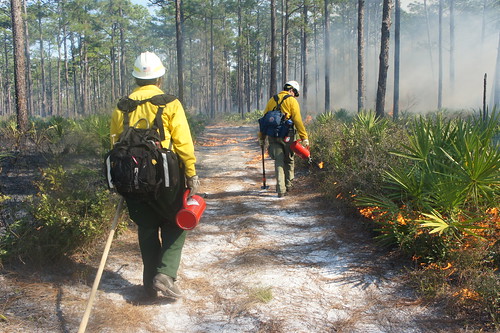
For the second time, I spilled burn mix on my clothing as I reached to replace a drip torch, a wildland firefighting tool used to ignite fires for controlled burns.
After three days of working with the Davidson River Initial Attack Crew, I was getting used to how things worked – except for the drip torch.
I’d spent the first seven years of my career buried behind papers and computers in the U.S. Forest Service Headquarters in Washington, D.C. When I heard of a job to improve firefighting training skills for Job Corps students, I jumped on it. As a Job Corps alumna, and someone who’s still passionate about the program, I felt that I was the perfect candidate.
Except that I had no fire experience.
So, eager to bolster my qualifications, I completed fire training at Harpers Ferry Job Corps. A year later, I started a temporary job with Davidson River to gain firefighting credibility. It was an amazing four months of dirt, fire and road – in the order of what I experienced the most. By the end of my training, I’d learned three lessons for surviving in the fire world. I soon realized they could be applied to regular life.
Pack light. My personal gear bag was a monster. Justifying its size, I swore that it only held essentials. After weeks of teasing, a fellow crew member predicted that I’d tire of carrying it. Sure enough, I downgraded after two months. I didn’t need many of those items, and I ditched the “body bag” for a much smaller pack.
Knowing what to take on fires depends on personal preference. Guided trial and error is the best way to personalize your gear for fire season. Getting rid of the extras from my gear bag was such a relief that I cleaned and downgraded other parts of my life like my massive purse and my shoe collection.
It continues to feel liberating.
Say yes. Aside from bathing in burn mix, my third day held successes. Like driving a bull dozer and riding in a fire engine. I think I created many great memories because I didn’t say “no.” And there were times I wanted to say “no”. Times when I had no idea what to do and didn’t want to risk failing.
I learned at the Action Review held after each burn that failure is a lesson. And when you share your lessons, others grow. So, the fear of failure dissipated into confidence that no matter what happened I would learn something.
Now, as I participate in meetings and projects, I present ideas or volunteer for lead roles. I’m not afraid of messing up or asking for help or failing. I’m more afraid of the experiences that I will miss if I never try.
Don’t sweat – the small stuff. The stains, tears and burns on personal gear tell a story about the person using it. A clean, flame-resistant Nomex shirt screams your status as a rookie or overhead, which is a supervisor. One glance at my eager smile and sparkling eyes revealed to which group I belonged.
I was lucky to keep my smile and sparkle for most of the season, although the early mornings and late nights took their toll towards the end of the fire season. What kept me sane was remembering to not sweat the small stuff. It still works. I ask myself, “Will this matter next year?” If the answer is “no”, and it usually is, I move on.
My first fire season was an introduction to embracing nature in its creation and destruction. I pushed myself, made friends and traveled to amazing places. I saw beautiful mountains, prairie land and a lakeside home that I instantly fell in love with.
“How many fire seasons would it take to buy this property,” I asked after a day of preparing the property for a nearby burn. “A lifetime,” someone yelled.
I saw that as a good thing because while I don’t have millions, I do have a lifetime.

